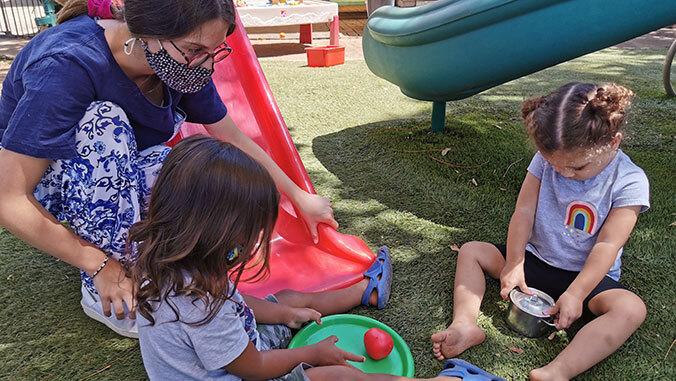UH Mānoa project addresses low pay for early childhood educators in Hawaiʻi

A University of Hawaiʻi at Mānoa report released last month shows how Hawaiʻi could improve pay and conditions for early childhood educators based on surveys of local educators and stakeholders.
“Retaining and finding staff is unbelievably difficult,” a licensed center director said in the survey. “This is due to low wages. People make more money working [in fast food] than in early childhood education. This is a disservice to staff who work hard daily and a disservice to children.”
The Early Childhood Educators in Hawai’i: Addressing Compensation, Working Conditions, and Professional Advancement report looked at compensation, working conditions, professional growth incentives and more.
The Hawai’i Early Childhood Educator Excellence and Equity (ECE3) Project based at the University of Hawaiʻi at Mānoa College of Education commissioned the RAND Corporation to conduct the fact finding.
“As we redesign the early educator preparation programs through higher education, we also need to close the compensation gaps to recruit and retain more highly qualified early educators,” said Theresa Lock, an early childhood instructor who directs the ECE3 Project. “The RAND report is the first step to achieving our vision of building a well-prepared, well-supported, and well-compensated early care and education workforce for our children, birth through age eight, and families in Hawaiʻi.”
The RAND research team conducted interviews with a dozen Hawaiʻi and national experts in the field of early childhood education. There were nine focus groups with a combination of 50 center and home-based providers and college students.
The survey was distributed to Department of Human Services licensed center directors and regulated family child care providers in Hawaiʻi and yielded responses from 99 directors and 48 providers representing 143 center-based sites.
Participants shared their views on being paid low wages. For example, wages and salaries were not competitive with jobs requiring similar levels of education or experience with a $10-15/hour disparity. In addition, benefit packages varied across settings, and there were challenges in providing supportive working conditions, problems with recruitment and retention, and limited incentives or support for continued education and professional development.

“It is very tough to keep good teachers with so many other jobs offering great pay and little stress,” a center director said.
“Most of us here on the islands, it’s usually a one-man operation,” said a family child care provider.
“There is no designated space, so I just kind of do [planning] in the classroom when the kids are asleep,” a center teacher said.
Based on their findings, the RAND research team developed a three-pillar roadmap with financing options and the following policy options:
1) Stabilize the early childhood educator workforce through wage supplements, initiatives to address benefits and working conditions, piloted salary scale and expanded apprenticeships.
2) Strengthen and sustain through salary scale, compensation parity and scaled up initiatives to address benefits and working conditions.
3) Support workforce policies through facilities investments, workforce registry, capacity for benchmarking compensation, key workforce indicators and other data systems.
With the completion of the RAND report, the ECE3 Project is convening a Compensation Implementation Plan Task Force, composed of representatives from various agencies, including: Hawaiʻi Careers for Young Children, Hawaiʻi Early Childhood Advocacy Alliance, Hawaiʻi Community Foundation, Department of Human Services, Executive Office on Early Learning and the Early Learning Board.
The purpose of the task force is to customize the roadmap to Hawaiʻi by utilizing lessons learned from other states and piloting initiatives at a smaller scale that would eventually be expanded statewide.
“We need everybody at the table — local, state and federal policymakers, early educators, business and community leaders, and families — backing these kinds of support so that essential early educators feel valued and can provide the critical service of educating our youngest learners,” UH College of Education Dean Nathan Murata said.






